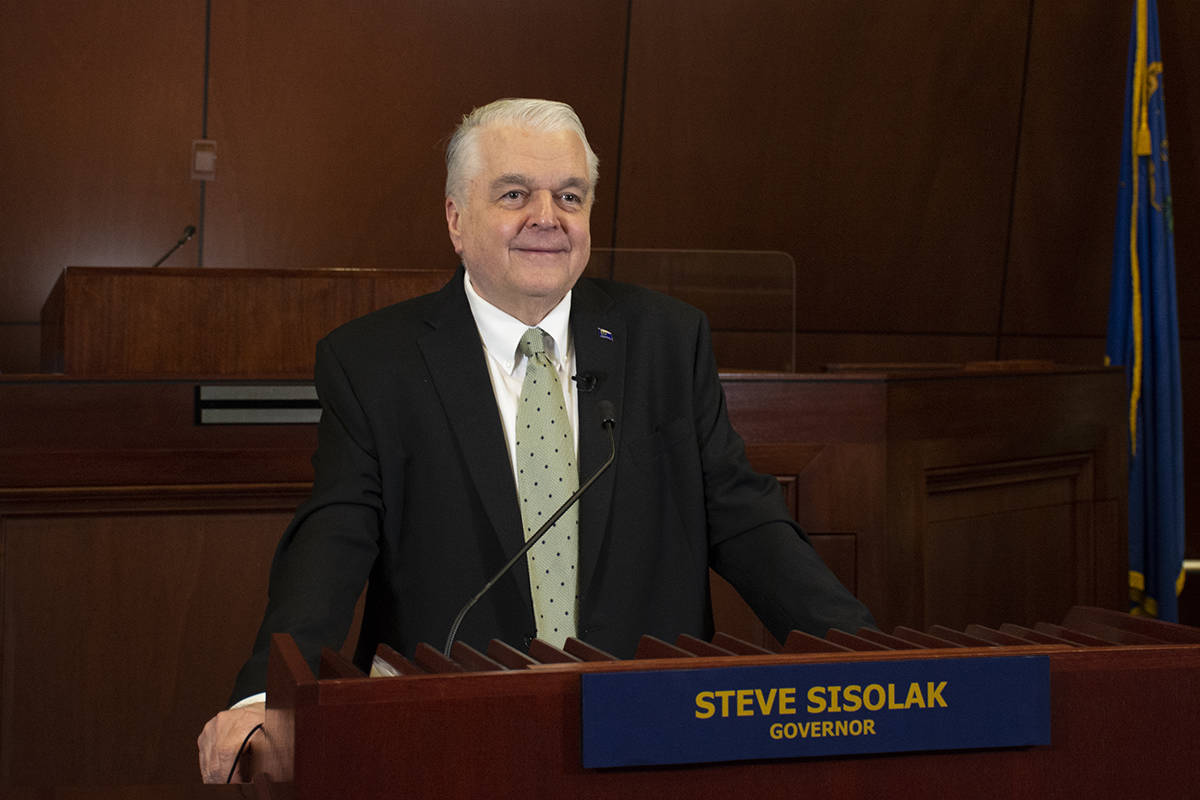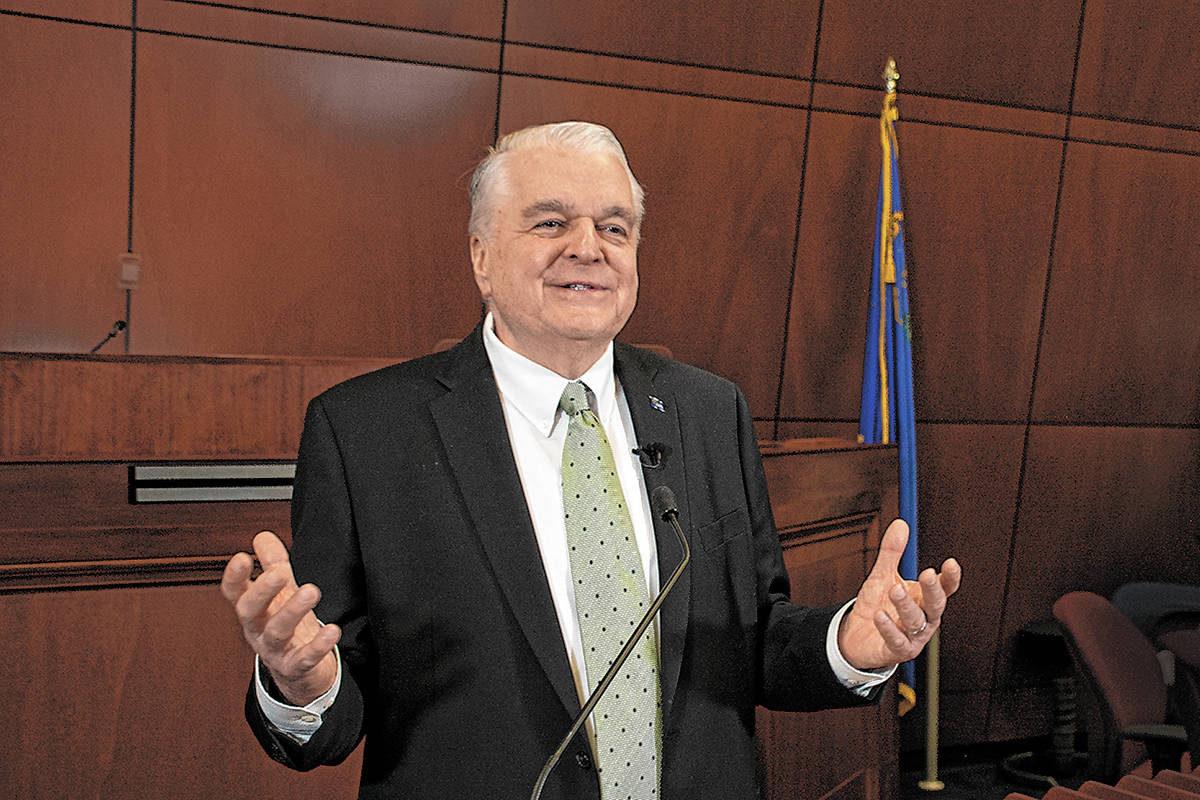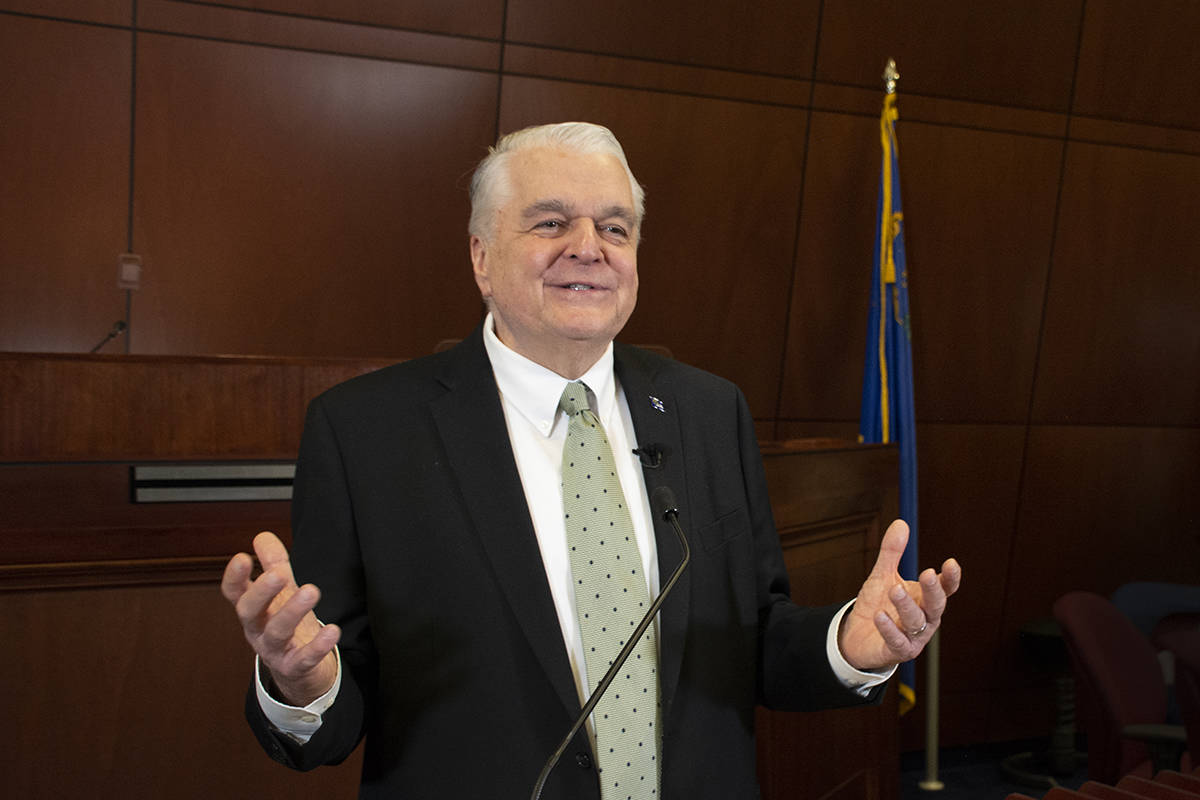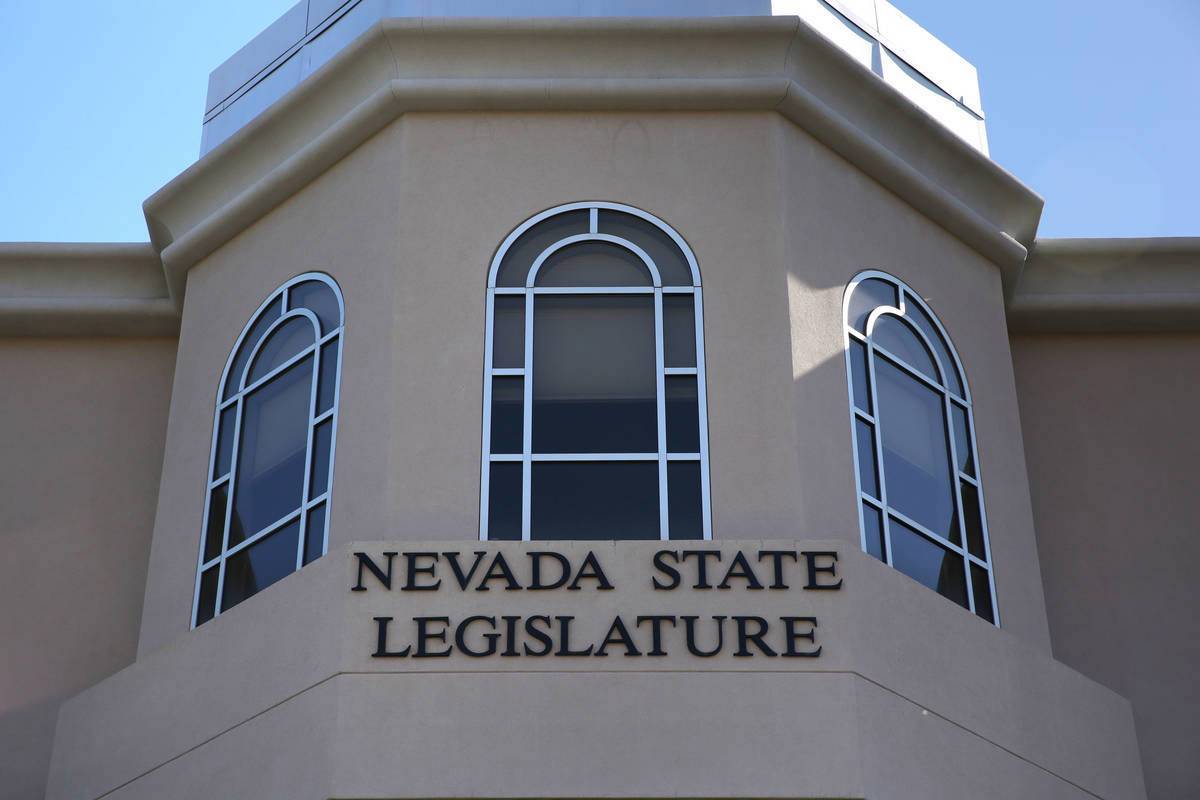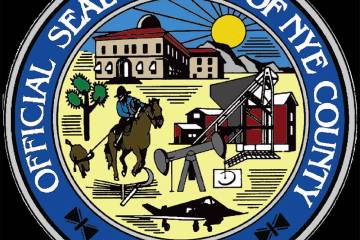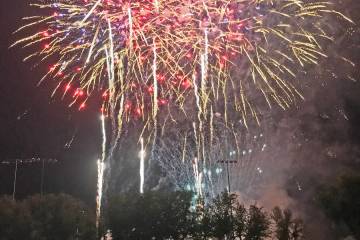Sisolak outlines Nevada recovery in biennial speech
CARSON CITY — Gov. Steve Sisolak on Tuesday laid out five economic development and recovery initiatives for a post-pandemic Nevada, setting forth his plan for how the state will move through and eventually past the modern-day plague that continues to sicken and kill thousands in the Silver State.
Delivering his second State of the State address in a 30-minute taped speech before an empty Assembly chamber, the governor said the programs could generate hundreds of thousands of jobs for a state that — for a time — had the highest unemployment in the nation last year.
He described a “new energy economy” for Nevada, “Innovation Zones” to bring technology companies to the state without tax abatements or public financing, and a “Nevada Job Force” to train workers for new jobs, or retrain those displaced by the pandemic whose jobs might never return.
Rounding out the list, he proposed an injection of funding for infrastructure capital projects, including rural broadband, renewable energy, and road improvements. And he proposed major upgrades to state’s antiquated information systems, overwhelmed most dramatically in 2020 by the weight of record-breaking unemployment claims driven by pandemic-caused business closures. The effort would be funded in part by aggressive pursuit of federal aid, he said.
Once implemented, Sisolak said, the programs could create 30,000 jobs in the short term, 170,000 construction and development jobs over a decade, and 165,000 permanent jobs.
“I believe in this state and our future,” Sisolak said. “We will support our current industries — like tourism — while developing new industries, embracing innovation, workforce training, and investing in infrastructure to create a more robust and sustainable economy. And we will emerge stronger from this pandemic and lead the nation in jobs and opportunity.”
“What will happen in the future regarding an improvement in our economy, any federal stimulus that might come, other suggestions that might come forward remain to be seen,” he said. “I had to base a budget based on what we have, what I can count on as opposed to what might be.”
The governor did not skip over the remaining challenge of the COVID-19 pandemic, which as of Tuesday had sickened nearly 264,000 Nevadans and killed some 3,800, as he summarized ongoing vaccination efforts, returning students and teachers to classroom learning, and otherwise rebuilding the state’s struggling economy. And he reviewed details of the proposed state budget he released Monday, which calls for a slight cut in overall spending over the two-year budget cycle that starts in July.
New initiatives
New energy economy: Noting Nevada’s location at the geographical center for energy transmission in Western states, Sisolak said the state could become to the energy industry “what Wall Street is to finance, or what Silicon Valley is to technology” and could “lead the world” in energy storage. He said he would work with lawmakers on legislation supporting increased clean energy transmission, storage, and distribution that would create new jobs and attract new industries, including electric vehicle infrastructure, component manufacturing and lithium mining.
Innovation Zones: Sisolak said companies at the forefront of “groundbreaking technologies” could be lured to Nevada without tax abatements or other publicly funded incentives. Following passage of legislation, he said, Blockchains, LLC has committed to proceeding with development of a “smart city” in Northern Nevada east of Reno that would run entirely on blockchain technology. He noted “other exciting innovations,” including ongoing work by UNLV physicists on superconductivity research.
New Nevada Economy: Sisolak noted many jobs lost to the pandemic will not return as businesses move toward automation, requiring retraining for displaced workers. He proposed a Nevada Job Force that would enlist leading companies in the state to fund, design and implement training programs. Citing an expanded role in workforce training for the state’s community colleges, he said he would also ask lawmakers to work with the Nevada System of Higher Education on a transition of community colleges to a new independent authority focusing on job training.
With the expansion of remote work driven by the pandemic, he said he was establishing a new Remote Work Resource Center “to connect Nevada workers with job opportunities across the globe.”
Infrastructure: Sisolak called on state and local agencies to fast-track infrastructure projects that have been stalled, saying: “The faster we move these projects from the list of things that we need to do to the list of the things that we are doing the more Nevadans we put to work.”
His recommended budget includes $75 million for capital improvement projects as part of the “State Infrastructure Bank,” which he said will be used to fund projects such as expanding rural broadband access, renewable energy and improving roads.
State information systems: The governor said he wants to work with lawmakers to modernize several state government systems — most notably the beleaguered unemployment claims system that was overwhelmed amid the coronavirus-related business closures.
Before the pandemic, the Department of Employment, Training and Rehabilitation handled an average of 20,000 unemployment insurance claims per week. But last year, that number spiked to 370,000 per week as businesses were forced to shut down, sending hundreds of thousands of Nevadans to the unemployment system almost overnight.
The backlog of cases has been reduced by some 95 percent, but more work needs to be done to shore the systems up, Sisolak said.
“Our computer infrastructure is still outdated, and our systems can be improved,” Sisolak said.
The governor said part of that solution is increasing the state’s share of federal grant dollars. His goal, he said, is to bring in $100 million more in federal grants over the next two years, and by up to $500 million annually by 2026.
“Better systems, modernization, private sector help, more federal dollars. That’s a big part of the path forward,.” Sisolak said.
State budget woes
Sisolak also went over the major parts of his budget, details of which were released Monday, which included the restoration of funding to many programs and projects that were cut last year, including the 6 percent cut to the Medicaid reimbursement rate, $40 million for preschool funding and funding for new medical school and engineering buildings at UNLV.
“The fact is, the state’s financial situation has improved slightly in the past few months,” Sisolak said.
In spite of lagging state revenue, the governor proposed no new taxes or increases in his budget. Asked why during a post-speech news conference Tuesday night, he said Nevada remains “under a state of emergency right now,” and he formulated his proposal “based on the revenue and the income that we have right now.”
His budget also includes a phased implementation of the state’s new K-12 funding formula that was passed in 2019 and was supposed to take effect by the 2021-2022 school year.
The phased approach would start in fiscal year 2021, which starts July 1, with only state funds going through the new formula for two years, followed by full implementation with state and local revenues starting in 2023.
“This phased-in approach will allow school districts to manage resources to meet the needs of their communities,” Sisolak said.
For many students in Nevada, it’s been nearly a year since they’ve been inside a classroom.
Sisolak said that needs to change, adding that he will do “whatever it takes to get our students back in the classroom.”
“COVID-19 has exacerbated educational inequities, further expanding the gap between have and have-nots,” Sisolak said.
Sisolak closed out his second State of the State address as governor by discussing the polarized state of politics in America.
“It has to end. It’s breaking down trust in our institutions and threatening our ability to solve the problems we face,” Sisolak said. “This is America. This is Nevada. And we need to pull together.”
Nevada’s governor typically addresses a joint session of the Legislature to deliver the state of the state, a ceremony that fell victim to continuing pandemic precautions and social distancing guidelines. The streamed address included pre-recorded clips from Nevadans who talked about the impact of COVID-19 on the business, health care and education sectors.
Republican response
Delivering the Republican response to Sisolak’s remarks, Assemblywoman Dr. Robin Titus, the GOP Assembly caucus leader, outlined the party’s own legislative initiatives for the 2021 session set to start Feb. 1.
She noted how the COVID-19 pandemic “exposed the fault lines in our health care system,” most notably a critical shortage of health care professionals, and that Republicans “will continue to bring forth solutions that keep our doctors in Nevada by removing burdensome regulations and creating incentives for new doctors.”
She said Republicans were focused on inequities in the education system also brought into relief by the pandemic, as well as protecting existing state industries, such as mining and tourism. And she addressed the need for “a tax-friendly business environment to attract new and innovative high-paying permanent jobs to our state and promote small-business growth,” decrying the “limitations of state government” in responding to the pandemic, including “draconian policies that decimated our private sector” and government agencies fumbling their response.
Resurrecting a battle Republicans waged nationwide during and after the 2020 presidential election, she said Republican would push “a slate of new bills to restore electoral confidence.”
Republicans brought of a host of unsuccessful challenges to voting procedures and outcomes before and after the election, making claims of voter fraud they could not substantiate in court.
Democrats react
Assembly Speaker Jason Frierson, D-Las Vegas, praised Sisolak’s approach.
“The budget of a family, of a state, of a nation reflects priorities,” he said in a statement. “I applaud the Governor for prioritizing the needs of Nevadans who have been hardest hit. Those priorities include access to affordable health care, getting our children back to school, and something I will personally advocate for— helping our small business owners with funds to get back on their feet.
“As legislators, we are all Nevadans first and I echo Governor Sisolak’s call tonight by asking my fellow legislators to work together to ensure that we build a state that can withstand the next crisis. We all have a part to play and we can show that Republicans and Democrats can put people over politics,” Frierson added.
His counterpart in the Senate, Majority Leader Nicole Cannizzaro, D-Las Vegas, said relief for hard-hit Nevadans was on the way.
“Over the last year, Nevadans have been asked to make unprecedented sacrifices in the face of a deadly pandemic and a tumultuous economic crisis,” she said. “But we’ve also seen communities pulling together, with everyday Nevadans stepping up to support their friends, families, and neighbors during unimaginably difficult times.”
“During the peak of last summer’s economic crisis, state revenues dropped dramatically, and we were forced to make difficult cuts to state services. We’re pleased that our state’s financial situation has improved, and we will be able to begin restoring critical funding in health care and education, while also modernizing key state services,” she added.
Contact Capital Bureau reporter Bill Dentzer at bdentzer@reviewjournal.com. Follow @DentzerNews on Twitter. Contact Capital Bureau Chief Colton Lochhead at clochhead@reviewjournal.com. Follow @ColtonLochhead on Twitter.


